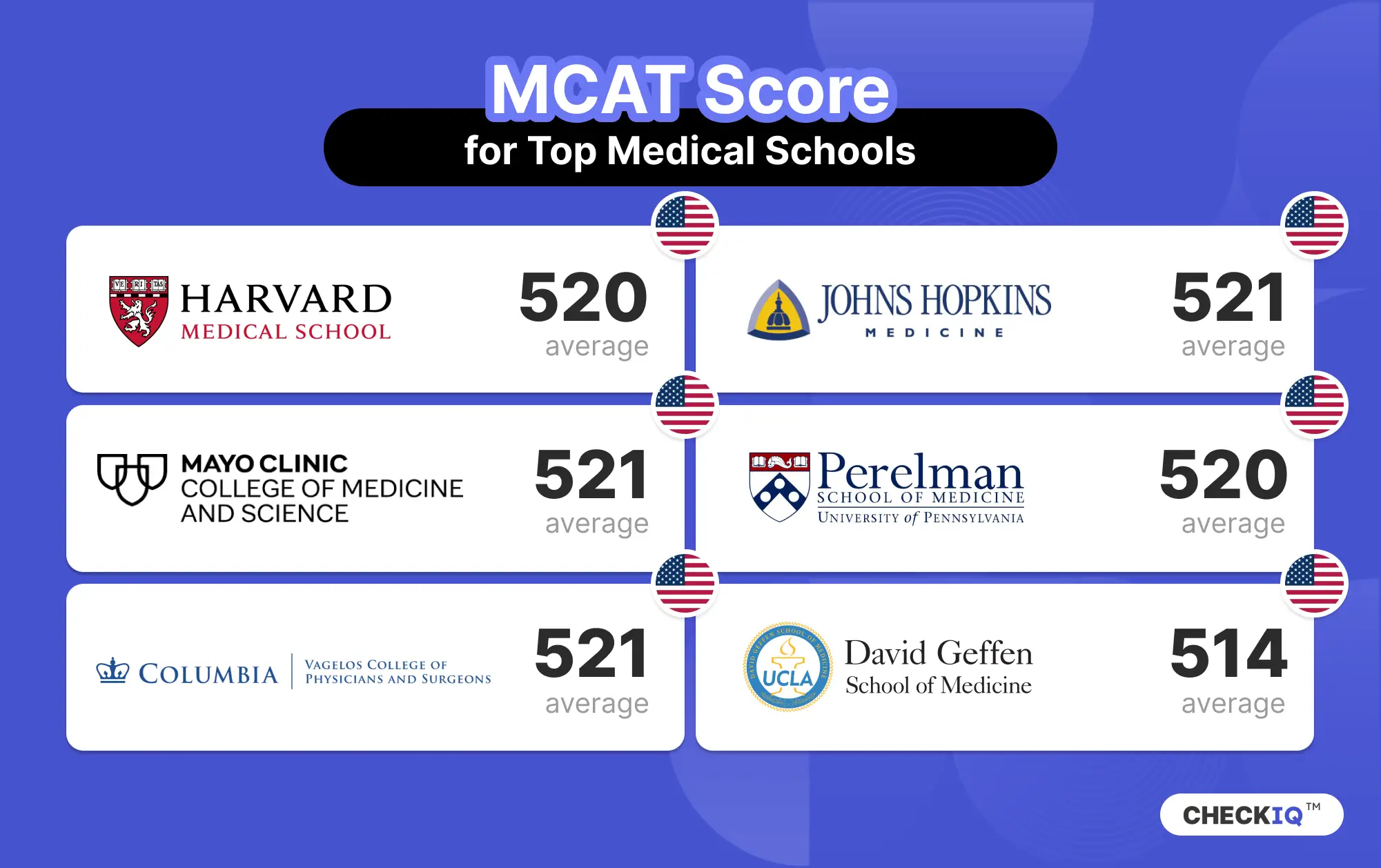
MCAT to IQ Calculator
Have you ever dreamed of becoming a doctor at prestigious medical schools like Johns Hopkins, Harvard or the Mayo Clinic? The MCAT (Medical College Admission Test) is an instrumental step in the journey toward a medical career, whether you aim to be a surgeon, pediatrician, or medical researcher.
Many students wonder how their MCAT performance relates to their innate intelligence or IQ. In this article, we’ll break it down, discuss the connections and misconceptions, and highlight the key takeaways.
What Is the MCAT?
The MCAT, or Medical College Admission Test, is a standardized exam that most medical schools in the U.S. and Canada require for admission. Created by the Association of American Medical Colleges (AAMC), MCAT assesses your readiness for the academic and intellectual challenges of medical school.
Think of the MCAT as a way for medical schools to get a sense of your academic abilities and problem-solving skills. You’ll need to memorize facts, think critically and apply what you know to solve complex problems. If you’re aiming for medical school, this test is a big part of your application and can play a key role in determining where you might get accepted.
Each year, more than 85,000 students take the MCAT, and it’s considered one of the most important steps on the path to becoming a doctor. While it is a demanding exam, thorough preparation and persistence can help you perform well and strengthen your application to medical school.
What Does The MCAT Measure?
The MCAT isn’t just about how much you know. It’s about how well you can use what you’ve learned. It tests skills and knowledge that are important for success in medical school, focusing on four key areas:
- Scientific knowledge: This part covers biology, chemistry, physics, and biochemistry. These are the building blocks of medical science, and you’ll need to understand them to answer questions that often combine multiple subjects.
- Critical analysis and reasoning skills: In this section, you’ll analyze and interpret information from passages. The topics might be about the humanities or social sciences, and the focus is on how well you can understand and think critically about what you’ve read.
- Behavioral sciences: This includes psychology, sociology, and biological concepts that explain behavior. It helps test your understanding of how people interact and how social and cultural factors affect health and healthcare.
- Problem-solving and reasoning: Across all sections, the MCAT looks at how well you can use logic and reasoning to solve complex problems, just like you’ll need to do as a medical student and doctor.
- Quantitative Skills: Evaluates your ability to understand and interpret data, including reading charts, graphs, and tables. These skills are crucial for evidence-based decision-making in medicine.
- Time management and stamina: Assesses your ability to maintain focus and perform under timed conditions. The MCAT's length and structure test your mental endurance, a vital skill for succeeding in medical school and beyond.
Unlike typical IQ tests, the MCAT focuses on how well you’ve prepared academically and how effectively you can apply that knowledge. It demonstrates your ability to apply your academic preparation and skills to meet the challenges of medical school.
A reliable 100% adaptive online IQ Test. Get your IQ score immediately.
Start My IQ Test
MCAT Scores Distribution
According to the AAMC, the mean total MCAT score is 506, with a standard deviation of 10.0, which means 68% of MCAT applications score between 496 and 516. Moreover, around 50% of test-takers score between 500 and 510, highlighting the concentration of scores near the mean. These scores follow a bell curve, with the majority clustering near the mean.
Here are some highlights about the MCAT scores distribution:
- Below 490: These scores are in the bottom 20% of all test-takers. Scoring in this range means your performance is below average. This score makes it challenging to gain admission to medical school unless you have an exceptional GPA and outstanding extracurriculars to strengthen your application.
- 490-500: Scores in this range fall between the 20th and 50nd percentiles, meaning you're performing close to the average. While scores here are respectable, they are often below the expectations of competitive medical schools. If you're in this range, you'll still need a strong GPA (above 3.6) and impressive clinical or research experience to stand out.
- 501-510: This range places you in the 51st to 79th percentiles, making you solidly above average. Many mid-tier medical schools consider scores in this range competitive, especially if you also have a GPA of 3.5 or higher and a well-rounded application with strong letters of recommendation and extracurricular activities.
- 511-519: Scores in this range rank between the 80th and 96th percentiles and are considered excellent. Applicants in this range are highly competitive for most medical schools. To maximize your chances, make sure your GPA is strong (ideally 3.7 or higher) and that your application includes leadership roles, clinical exposure, and a compelling personal statement.
- 520 and Above: These scores place you in the top 3% of all test-takers, at the 97th percentile or higher. Scoring this high demonstrates exceptional performance and gives you a significant advantage when applying to top-tier medical schools like Harvard or Johns Hopkins. A score in this range often indicates strong critical thinking, problem-solving, and academic abilities, which are crucial for success in medical school. Pairing a score in this range with a GPA above 3.8 and standout extracurriculars makes you a strong candidate for even the most selective programs.
What’s a Good MCAT Score?
A "good" MCAT score depends on your target medical schools, but generally speaking, a score of 510 MCAT and above is considered a good MCAT score. Looking at the percentile ranks, this roughly corresponds to the 80th percentile, which means that you score in the top 20%. This makes you a strong candidate for most American medical schools. For elite programs, you should aim for a score of at least 515 which will put you in the 90th percentile (top 10%) or higher. Meanwhile, for the best institutions, such as Harvard, Johns Hopkins, and Stanford, aiming for a score above 520 will strengthen your application further. Let’s see it in more detail.
What Is the Average MCAT Score to Get Into a Top Medical School?
Gaining admission to a top medical school requires a highly competitive MCAT score.
For instance, according to BestColleges, Harvard University has an average MCAT score of 520.59 and an average GPA of 3.9, while Johns Hopkins University and the Mayo Clinic Alix School of Medicine both report average MCAT scores of 521 with GPAs around 3.92-3.94.
The University of Pennsylvania (Perelman) follows closely with an average score of 520.8. Schools like Columbia University (Vagelos) accept a range of scores, from 508 to 528, depending on other factors like GPA, which can range from 2.98 to 4.0.

For those targeting California schools, the University of California, Los Angeles (UCLA) averages an MCAT score of 514.0.
Ultimately, a competitive MCAT score for these programs is usually above 514, with many schools expecting scores closer to 520 or higher, paired with an excellent GPA.
Is There a Relationship Between MCAT and IQ?
IQ tests are designed to measure human intelligence, which includes skills like problem-solving, reasoning, and abstract thinking. These tests help provide a general understanding of someone’s cognitive abilities across different areas. To explore how the MCAT aligns with or differs from IQ assessments, let’s take a closer look.
Correlation between MCAT and IQ
The MCAT is often compared to IQ tests because both require cognitive skills like critical thinking and reasoning. However, they are very different. An old research by Matarazzo and Goldstein (1972), found a moderate to strong correlation between MCAT and IQ scores (r = 0.60 to 0.75), largely due to overlapping skills like verbal and quantitative reasoning.
However, the MCAT also tests domain-specific knowledge and readiness for medical school, making it distinct from IQ tests, which measure general cognitive ability. While they are related, one does not perfectly predict the other.
So, just because they’re related doesn’t mean they’re the same, and one doesn’t predict the other perfectly.
So, how exactly do the MCAT and IQ tests differ in what they measure and how they assess your abilities?
Key differences between the MCAT and IQ tests
- Purpose: The MCAT is designed to predict how well you’ll perform in medical school, while IQ tests measure general intelligence.
- Scope: IQ tests measure broad cognitive abilities, while the MCAT focuses on specific academic subjects, like biology and chemistry, and critical thinking.
- Preparation: IQ tests aren’t influenced much by preparation, while the MCAT depends heavily on how much time you spend studying and practicing.
- Testing context: The MCAT is taken in a controlled, high-stakes environment and is a key factor in medical school admissions, while IQ tests are often used for general assessment and research purposes, not admissions decisions.
- Outcome relevance: The MCAT provides a detailed evaluation of academic readiness for a specific field (medicine), whereas IQ tests aim to provide a general measure of intellectual potential applicable across various domains.
Can you convert an MCAT score to an IQ?
There’s no exact or scientifically proven way to convert an MCAT score into an IQ. However, we can estimate it using percentile matching. This method has its flaws which we’ve highlighted later on in this article, but it provides a rough estimate.
How the percentile matching method works
- Find your MCAT percentile: Every MCAT score comes with a percentile that shows how you compare to other test-takers. For instance, if you score 520, you’re in the 98th percentile. Similarly, a score of 510 places you around the 80th percentile, indicating you performed better than 80% of test-takers.
- Match it to an IQ percentile: IQ scores also follow a bell curve, with 100 being average. For example, the 98th percentile on an IQ test corresponds to an IQ score of about 130-132 according to our IQ percentile calculator. So we could assume that an MCAT of 520 is equivalent to an IQ of 130. Similarly, the 80th percentile on an IQ test aligns with an IQ score of approximately 115, indicating above-average intelligence. This implies that a 510 at MCAT is loosely equivalent to a 115 IQ.
Here are a few more examples:
- 520 MCAT Score → Percentile: 97th → IQ Equivalent: 130-132
- 510 MCAT Score → Percentile: 80th → IQ Equivalent: 115–117
- 505 MCAT Score → Percentile: 60th → IQ Equivalent: 105–107
- 500 MCAT Score → Percentile: 50th → IQ Equivalent: 100
- 495 MCAT Score → Percentile: 35th → IQ Equivalent: 93–95
- 485 MCAT Score → Percentile: 10th → IQ Equivalent: 80–83
MCAT to percentile to IQ table
The table below shows how MCAT scores match up with percentiles, estimated IQ scores, and how rare each score is, based on the percentile matching method. It’s based on the AAMC’s percentile ranks for 2024-2025.
|
MCAT |
Percentile |
IQ |
Rarity |
|
524 to 528 |
100 |
140 and above |
Less than 1 in 200 people |
|
522 |
99 |
135 |
1 in 102 people |
|
521 |
98 |
131 |
1 in 52 people |
|
520 |
97 |
128 |
1 in 32 people |
|
518 |
95 |
125 |
1 in 21 people |
|
514-515 |
90 |
120 |
1 in 11 people |
|
512 |
84 |
115 |
1 in 6 people |
|
507 |
70 |
108 |
1 in 3 people |
|
500-501 |
50 |
100 |
1 in 2 people |
|
494 |
30 |
92 |
3 out of 4 people |
Limitations of Converting MCAT Scores to IQ
While using percentile matching to compare MCAT scores to IQ might seem easy, this method has some key limitations:
- Different focus: The MCAT measures academic preparation in specific areas like biology, chemistry, and reasoning, while IQ tests assess general cognitive ability. Scoring well on the MCAT doesn’t necessarily mean a high IQ, as the two measure different skill sets.
- Unvalidated comparisons: MCAT and IQ scores come from different populations and scales. The MCAT is taken by highly educated students, while IQ tests measure the general population. Aligning percentiles assumes the distributions are the same, which they are not.
- Impact of preparation: The MCAT rewards intensive study and mastery of specific content, while IQ tests measure innate abilities that don’t change much with preparation. This makes MCAT scores more reflective of effort and learning than raw intelligence.
- Test structure differences: The MCAT is a multiple-choice, time-bound test that includes problem-solving tasks, while IQ tests vary in format and often include tasks related to pattern recognition, spatial reasoning, and verbal ability.
- Cultural bias: IQ tests are sometimes criticized for having cultural biases that may impact how individuals from different backgrounds perform. The MCAT, while standardized, is still subject to bias based on academic preparation, resources, and socioeconomic status, affecting how comparable the scores truly are across different populations
How Important is the MCAT to Succeed in Medical School?
The MCAT plays a vital role in gaining admission to medical school, but it is not the only predictor of success during your medical education or in your medical career. While a high MCAT score demonstrates academic readiness and problem-solving skills, other factors are just as important. For example, a strong undergraduate GPA showcases consistent academic performance, while hands-on clinical experience and meaningful extracurricular activities reflect a genuine commitment to the field of medicine.
Furthermore, personal traits like empathy, communication skills, and resilience are also essential. They contribute to your ability to connect with patients, work in teams, and handle the emotional and intellectual challenges of medical school and practice.
A study conducted by Robert W. Service (2011) emphasizes the importance of "successful intelligence", which is a combination of practical, interpersonal, and emotional skills, over pure academic ability for long-term success. This means that while the MCAT is an essential step in the admissions process, medical schools are increasingly looking for well-rounded applicants who bring more than just high test scores to the table. Thus, success in medicine requires a balance of academic preparation, personal qualities, and real-world experience.
Frequently Asked Questions on MCAT and IQ
Does studying for the MCAT increase IQ?
While studying for the MCAT doesn’t directly increase IQ, it helps you build useful skills like:
- Problem-solving
- Critical thinking
- Learning new strategies
These benefits reflect improved academic performance, but, although IQ itself may vary a bit over time, it remains relatively stable.
What is the typical IQ of medical students?
Research suggests that medical students have an average IQ between 120 and 130, with study by Hauser (2002) placing it at 121. This makes doctors one of the highest IQ groups, even surpassing college professors. However, as Jacob Appel (2023) notes, once the baseline intelligence required to succeed in medical school is met, which includes other qualities, such as empathy, resilience, and interpersonal skills become far more important for success as a physician. Ultimately, patient care relies on clinical skills and judgment, not IQ scores.
How do MCAT scores and GPA affect medical school acceptance?
Medical school acceptance is strongly influenced by both MCAT scores and GPA. According to data published by the Association of American Medical Colleges, applicants with a GPA above 3.79 and an MCAT score greater than 517 have the highest acceptance rate of 81.7%, while those with GPAs below 3.20 or MCAT scores below 494 face acceptance rates of less than 5%.
A strong MCAT score can partially offset a lower GPA. For instance, applicants with a 3.40-3.59 GPA and MCAT scores of 514-517 still see an acceptance rate of 56.5%. However, those with both low GPAs (below 3.00) and low MCAT scores (under 500) rarely gain admission, with rates often below 2%.
Overall, the combined acceptance rate across all applicants is 41.9%, emphasizing the importance of excelling in both metrics to remain competitive.
Does Mensa accept MCAT scores?
No, Mensa does not accept MCAT scores for membership, like most high IQ societies. To join Mensa, you need to provide results from recognized IQ tests, such as the Cattell or Stanford-Binet, or standardized tests like the GRE, LSAT, or SAT, if their percentile rankings place you in the top 2% of the population.
Can you improve MCAT with practice?
Yes, focused preparation and targeted practice can hugely improve MCAT scores. Since, the MCAT is a standardized test that assesses academic knowledge and reasoning skills, students can improve their performance by studying the specific content areas, practicing problem-solving strategies, and familiarizing themselves with the test format. For instance, repeated exposure to practice questions and timed simulations trains both speed and accuracy, allowing students to perform better on test day. Therefore, the more you study and practice, the better equipped you are to tackle the types of questions you'll encounter on the MCAT.
Can you improve IQ with practice?
Improving IQ is more challenging because IQ tests aim to measure innate cognitive abilities like reasoning, memory, and problem-solving, which are generally more consistent over time.
However, evidence suggests that certain cognitive skills associated with IQ can improve through practice. For instance engaging in activities like problem-solving puzzles, abstract reasoning exercises, and memory games can enhance specific cognitive abilities.
While these activities won't necessarily raise your "true" IQ, they can help you perform better on IQ tests by making you more familiar with the question types and improving your overall mental agility.







